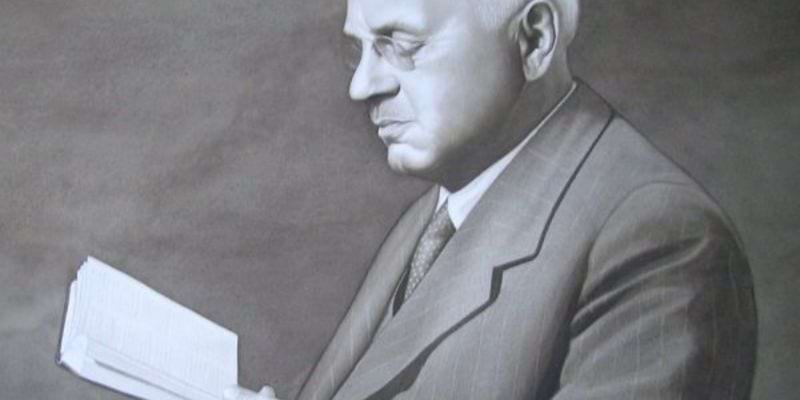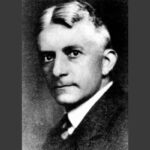Alfred Adler biography, theory and books

Alfred Adler (February 7, 1870 – May 28, 1937) was an Austrian psychologist, psychiatrist, physician and the founder of individual psychology, also called Adlerian psychology. Next to Sigmund Freud and Carl Jung, dr. Alfred Adler is also considered the third founding father of psychoanalysis. He coined the term ‘inferiority complex’ and was a pioneer when it comes to the attention he gave to community life and the social nature of man.
Biography
Dr. Alfred Adler was born just outside Vienna on February 7, 1870. He was the third of seven children of Hungarian-Jewish parents. As a young child he was sick a lot. He developed rickets and almost died from pneumonia when he was 5 years old. His desire to overcome these physical limitations, led him to decide to become a doctor.
In 1895 he graduated in medicine from the University of Vienna. Sigmund Freud and his later wife, Raissa Timofeyewna Epstein, had also studied here. Raissa was a social activist from Russia who was a central figure in the Austrian women’s movement.
Adler initially started his career as an ophthalmologist, but then switched to general practice. He had a great interest in compensating for physical limitations. In 1907 he published his article ‘Study of Organ Inferiority and Its Psychical Compensation’, which attracted the attention of Sigmund Freud and led to a meeting.
Alfred Adler Contribution to Psychology
Together with Rudolf Reiler and Wilhelm Stekel, Freud and Adler began meeting weekly at their ‘Wednesday Night Meetings’, which marked the beginning of the psychoanalytic movement. Adler became the first president of the Vienna Psychoanalytic Society, which they had formed together.
Not much later Adler developed his own ideas from Freud’s and gradually the differences in ideas between the two became irreconcilable. In 1911, together with a group of followers, Adler broke ties with Freud and Freudian psychoanalysis. He then deepened his own school of thought, Individual Psychology.
Individual Psychology
In 1912, Adler founded the Society of Individual Psychology. Individual psychology, or Adlerian psychology, emphasizes the human need and ability to create positive social change and impact. Adler advocated a holistic view of the individual and social equality.
Where Freud emphasized a divided personality, in which an inner struggle can take place between different parts within the individual, individual psychology emphasizes the indivisibility and unity of each person.
Alfred also emphasized the patient in relation to the total environment and sees man as a social being. The need of the individual to ‘belong’ is called ‘Gemeinschaftsgefühl’ by Adler. For him, the social and community domain was as important as the domain of the individual.
Adler also believed that man was capable of developing its own personality, for which he used the concept of ‘the creative self’. In this process we strive for perfection or completeness, which Adler calls ‘superiority’. Feelings of lack herein can lead to feelings of inferiority.
At one extreme this can lead to an overwhelming inferiority complex and at the other extreme to overcompensation in the form of egocentric and self-aggrandizing behavior at the expense of others.
An Adlerian psychotherapist can help a patient become aware of these feelings of inferiority and help build self-esteem. Here, more realistic goals, more useful behavior and a stronger social interest are encouraged by the therapist.
Later Life
During World War I, Alfred Adler served as a doctor in the Austrian army. He then specialized in child psychiatry and in 1921 he founded his first child guidance clinic in Vienna. This was the first of 30 clinics in total. He also gave lectures in Europe and the United States. In 1927 he became a visiting professor at Columbia University.
In the 1930s, Adler was forced to close his clinics because of his Jewish origins. In 1935 he emigrated to the United States and taught at Long Island College of Medicine in New York.
In 1937, Alfred Adler died of a heart attack during a lecture tour in Aberdeen, Scotland. His body was cremated in Edinburgh, but it was not until 2011 that his ashes were recovered and returned to Vienna for burial.
Quotes by Alfred Adler
- “Follow your heart but take your brain with you.”
- “No experience is a cause of success or failure. We do not suffer from the shock of our experiences, so-called trauma – but we make out of them just what suits our purposes.”
- “It is easier to fight for one’s principles than to live up to them.”
- “God who is eternally complete, who directs the stars, who is the master of fates, who elevates man from his lowliness to Himself, who speaks from the cosmos to every single human soul, is the most brilliant manifestation of the goal of perfection.”
- “Trust only movement. Life happens at the level of events, not of words. Trust movement.”
- “Death is really a great blessing for humanity, without it there could be no real progress. People who lived for ever would not only hamper and discourage the young, but they would themselves lack sufficient stimulus to be creative.”
- “The only normal people are the ones you don’t know very well.”
- “My difficulties belong to me!”
- “The chief danger in life is that you may take too many precautions.”
- “The truth is often a terrible weapon of aggression. It is possible to lie, and even to murder, with the truth.”
- “The science of the mind can only have for its proper goal the understanding of human nature by every human being, and through its use, brings peace to every human soul.”
- “A lie would have no sense unless the truth were felt as dangerous.”
- “We cannot say that if a child is badly nourished he will become a criminal. We must see what conclusion the child has drawn.”
- “Seeing with the eyes of another, listening with the ears of another, and feeling with the heart of another.”
- “War is organized murder and torture against our brothers.”
- “War is not the continuation of politics with different means, it is the greatest mass-crime perpetrated on the community of man.”
- “To all those who walk the path of human cooperation war must appear loathsome and inhuman.”
- “To be a human being means to possess a feeling of inferiority which constantly presses towards its own conquest. The greater the feeling of inferiority that has been experienced, the more powerful is the urge for conquest and the more violent the emotional agitation.”
- “In the investigation of a neurotic style of life, we must always suspect an opponent, and note who suffers most because of the patient’s condition. Usually this is a member of the family.”
- “A simple rule in dealing with those who are hard to get along with is to remember that this person is striving to assert his superiority; and you must deal with him from that point of view.”
- “Exaggerated sensitiveness is an expression of the feeling of inferiority.”
- “Meanings are not determined by situations, but we determine ourselves by the meanings we give to situations.”
- “We must never neglect the patient’s own use of his symptoms.”
- “We learn in friendship to look with the eyes of another person, to listen with her ears, and to feel with her heart.”
- “The test of one’s behavior pattern is their relationship to society, relationship to work and relationship to sex.”
- “We must interpret a bad temper as a sign of inferiority.”
- “Our modern states are preparing for war without even knowing the future enemy.”
- “Nobody adopts antisocial behavior unless they fear that they will fail if they remain on the social side of life.”
- “Men of genius are admired, men of wealth are envied, men of power are feared; but only men of character are trusted.”
- “There is no such thing as talent. There is pressure.”
- “It is very obvious that we are not influenced by “facts”
but by our interpretation of the facts.” - “No man can think, feel, will, nor even dream, without everything being defined, conditioned, limited, directed by a goal which floats before him.”
- “You can be healed of depression if every day you begin the first thing in the morning to consider how you will bring a real joy to someone else.”
- “Overcoming difficulties leads to courage, self-respect, and knowing yourself.”
- “Life is just the same as learning to swim. Do not be afraid of making mistakes, for there is no other way of learning how to live!”
- “I am grateful for the idea that has used me.”
- “There is a courage of happiness as well as a courage of sorrow.”
“My psychology belongs to everyone.” - “Play is a child’s work and this is not a trivial pursuit.”
- “The goal of the human soul is conquest, perfection, security, superiority.”
- “All failures are so because they lack social interest.”
- “There is only one reason for an individual to side-step to the useless side : the fear of a defeat on the useful side.”
- “It is well known that those who do not trust themselves never trust others.”
Books and Publications by Alfred Adler et al.
Alfred Adler published more than 300 books and articles during his lifetime. Below you will find twenty of his most important publications.
- 2003. The collected clinical works of Alfred Adler (Vol. 1-16). Routledge.
- 1992. Understanding human nature: The psychology of personality. Hazelden.
- 1964. Superiority and social interest: A collection of later writings. Northwestern University Press.
- 1956. The individual psychology of Alfred Adler: A systematic presentation in selections from his writings. Basic Books.
- 1941. Problems of neurosis: A book of case histories.
- 1940. Man’s nature and his communities. Viking Press.
- 1938. The neurotic disposition: Diagnosis and prognosis.
- 1933. Social interest: A challenge to mankind.
- 1931. What life could mean to you. Capricorn Books.
- 1930. The education of children.
- 1930. The pattern of life.
- 1930. The science of living.
- 1929. Individual psychology. Harper Torchbooks.
- 1927. Understanding human nature. Greenberg.
- 1927. The practice and theory of individual psychology. Harcourt, Brace.
- 1921. On the margin of the future: The “milieu” as a factor in human evolution.
- 1912. The problem of nervousness.
- 1912. The nervous character.
- 1912. The neurotic constitution: Outlines of a comparative individualistic psychology and psychotherapy.
- 1907. Study of organ inferiority and its psychical compensation.
How to cite this article:
Baas, S. (2023). Alfred Adler. Retrieved [insert date] from Toolshero: https://www.toolshero.com/toolsheroes/alfred-adler/
Original publication date: 12/06/2023 | Last update:12/06/2023
Add a link to this page on your website:
<a href=” https://www.toolshero.com/toolsheroes/alfred-adler/”>Toolshero: Alfred Adler</a>











